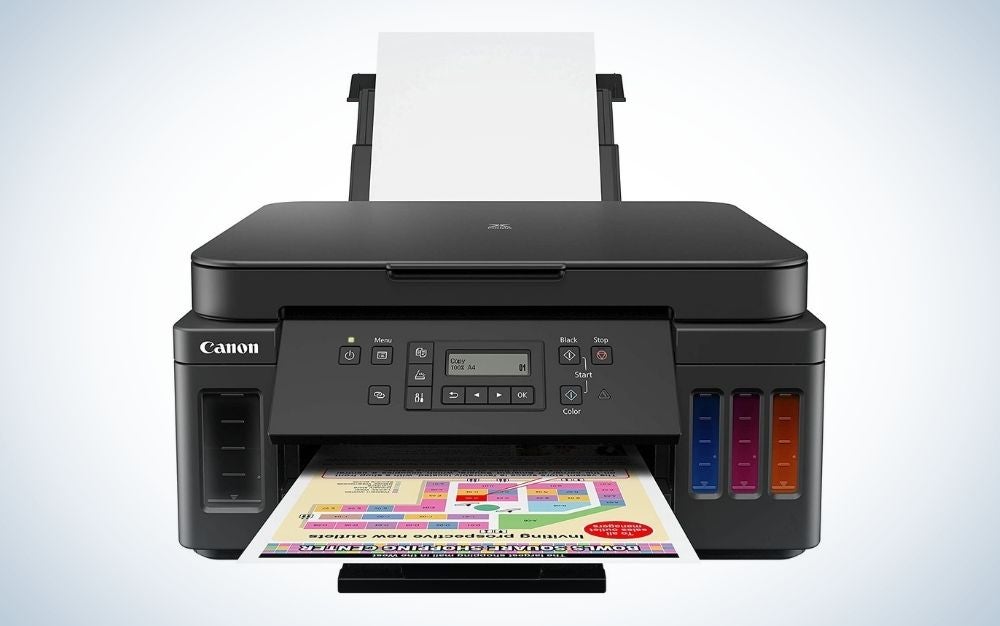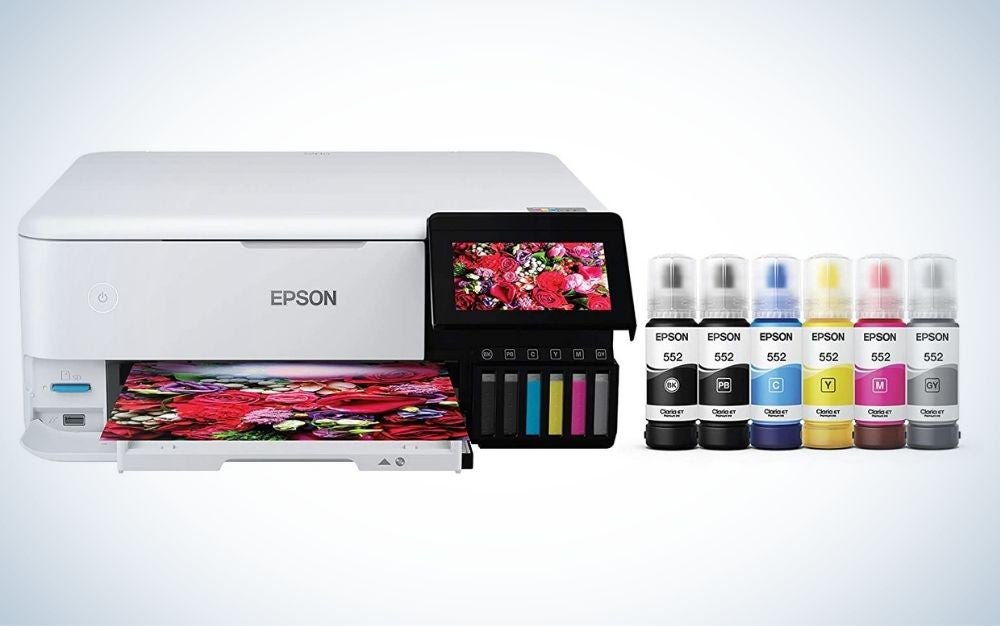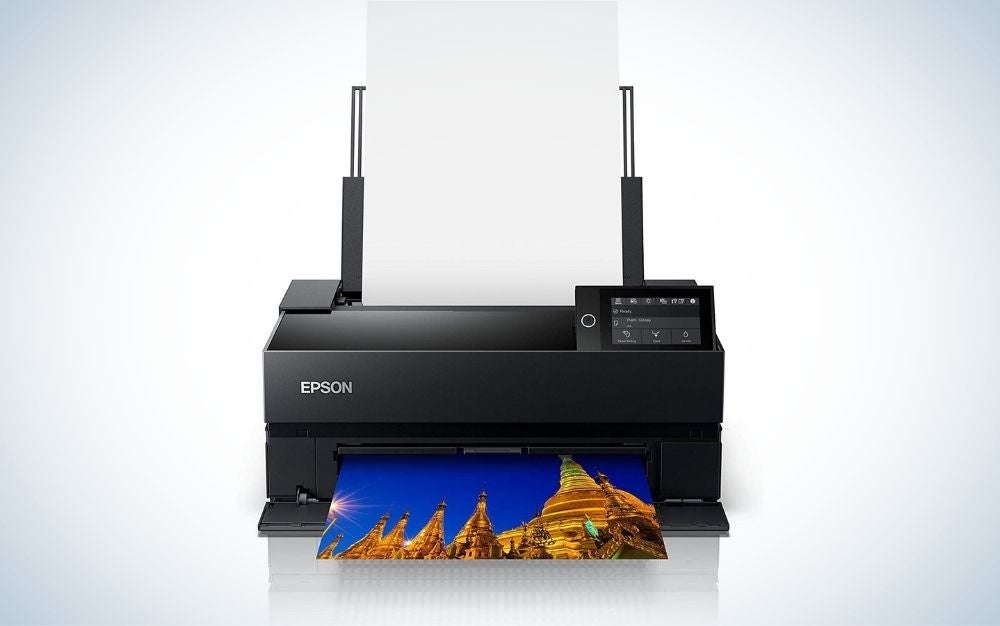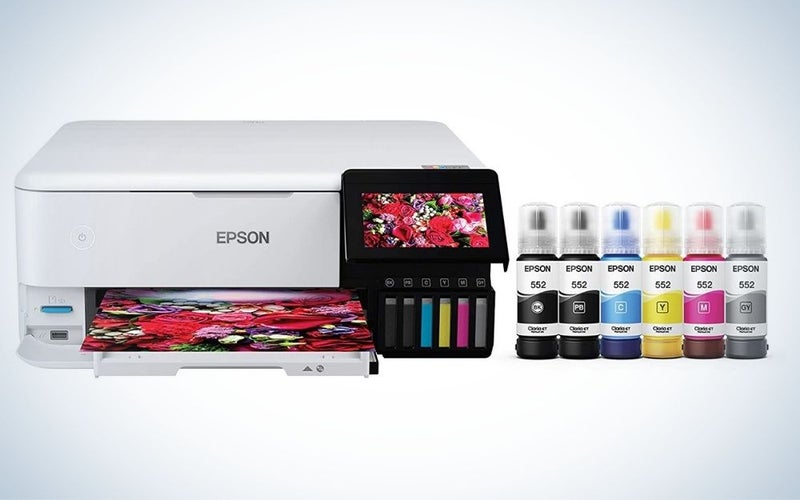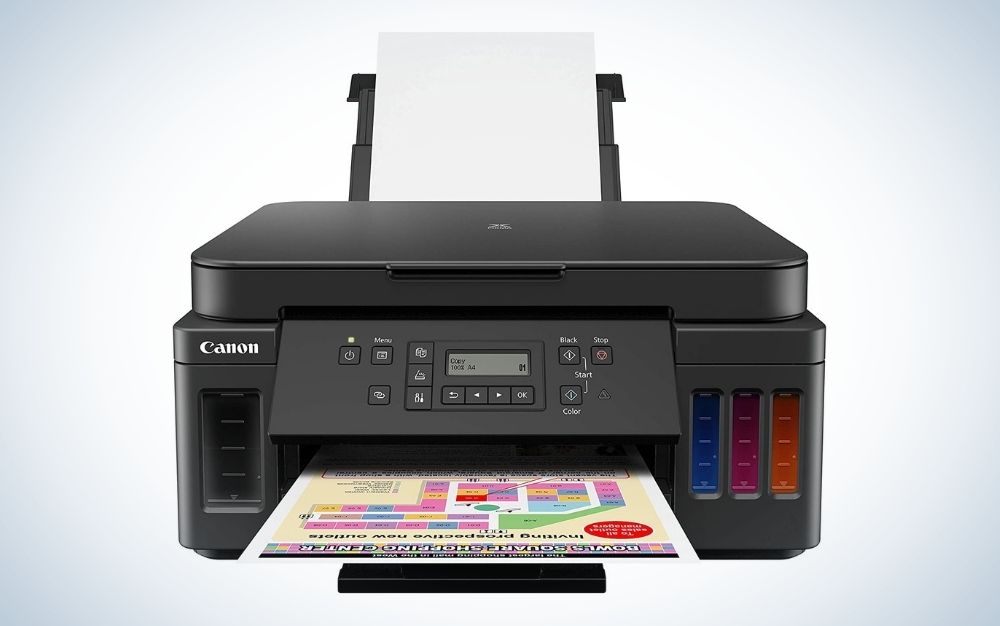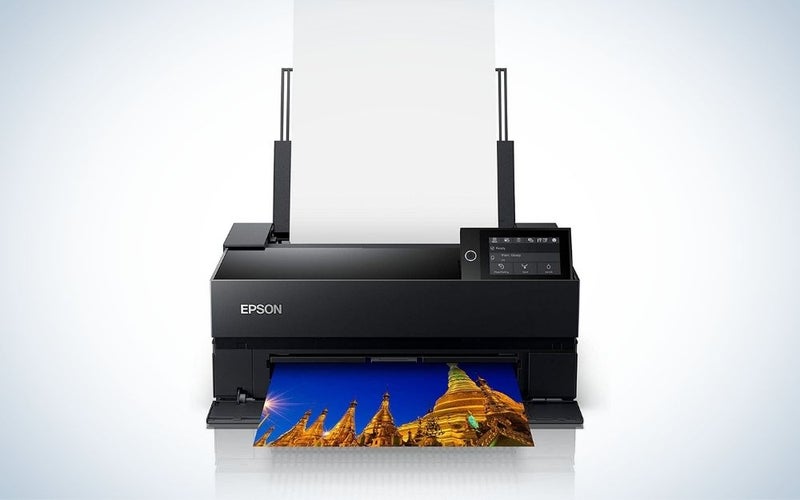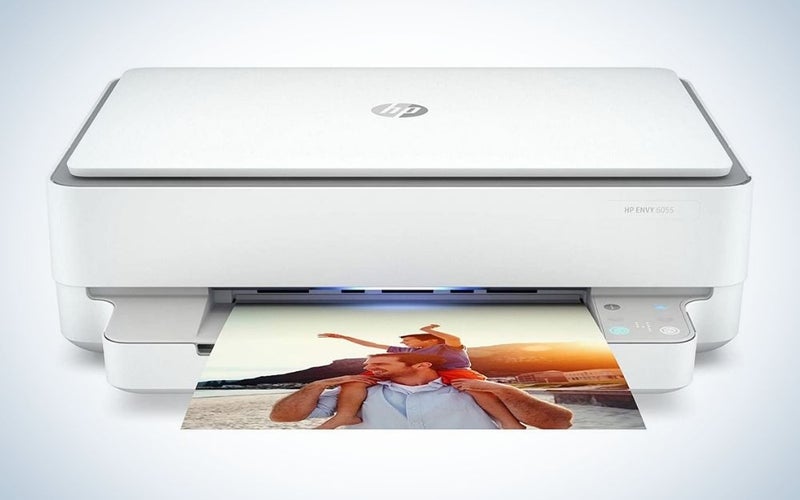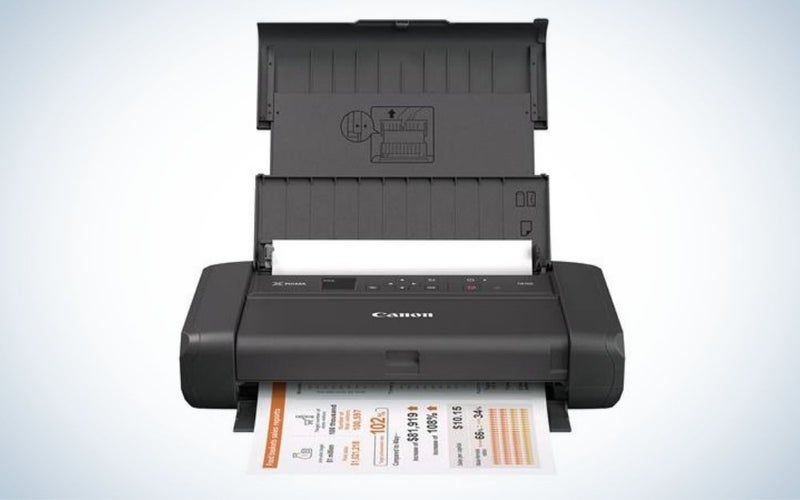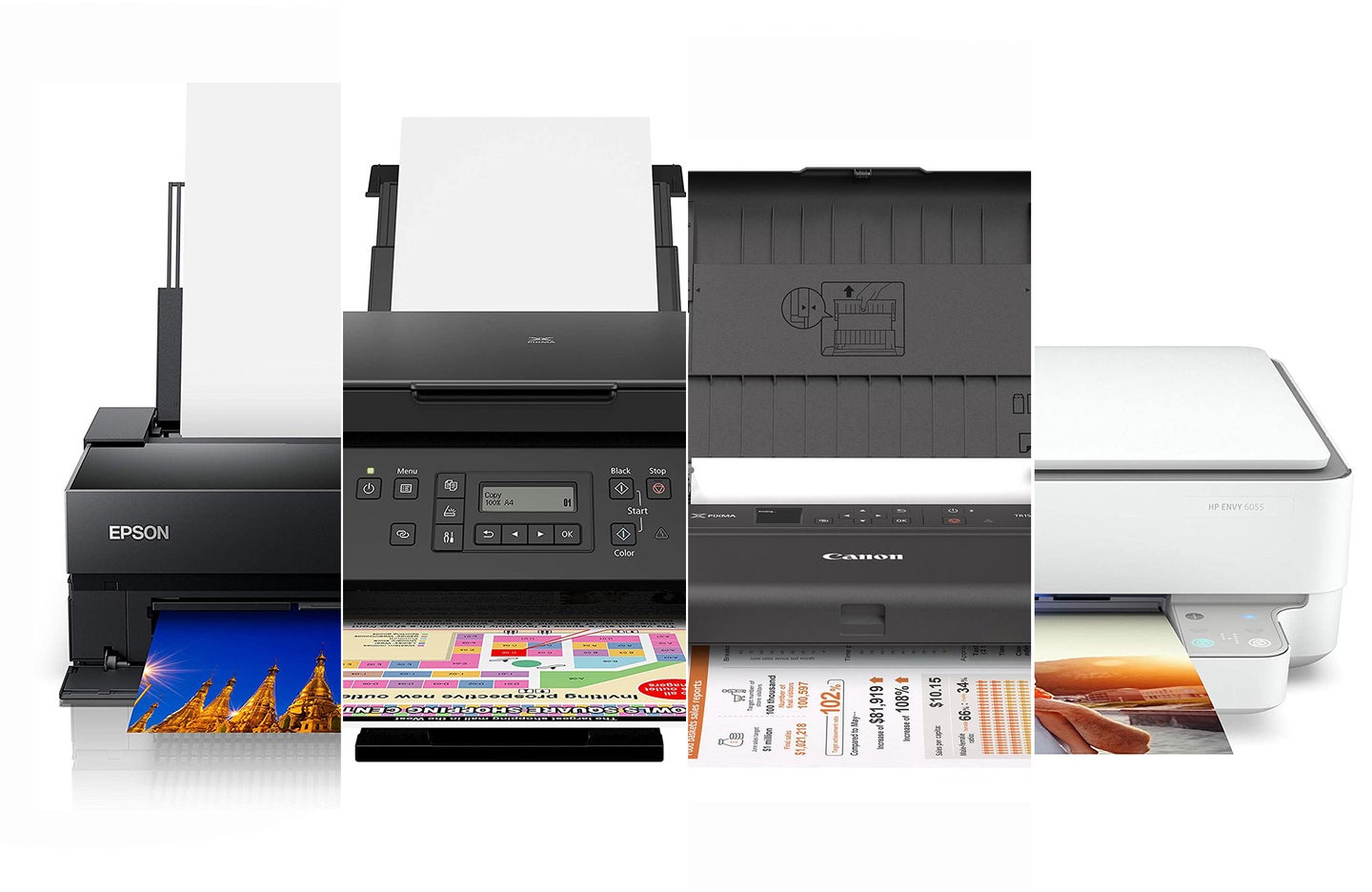
We may earn revenue from the products available on this page and participate in affiliate programs. Learn more ›
Inkjet printers can not only make your life more convenient, but they can also spark creativity and add a new dimension to your work. Printers are, of course, useful for mundane business things like printing client contracts or invoices. But being able to print your own photographs can also open new creative doors. And having access to a scanner can unlock new opportunities if you opt for an all-in-one inkjet printer.
Whether you are printing high-end fine art prints for selling or hanging in galleries or simple proofs to display memories on your walls, seeing a physical print of your creation in your hand can be inspiring and motivating. It can lead you to see your work in a new way and help you improve and grow as a photographer. No matter what you need a printer for, the best inkjet printers will meet your business needs and more.
- Best overall: Epson EcoTank Photo ET-8500
- Best all-in-one: Canon PIXMA G6020 Wireless MegaTank All-in-One Printer
- Best for photos: Epson SureColor P700
- Best budget: HP Envy 6055
- Best portable: Canon Pixma TR150
How we picked the best inkjet printers
When selecting the options for this list of best inkjet printers, we considered how most users would be using them and, based on that, what the most important features would be. Print and scanning quality were, of course, important, but we also looked at running costs, media size and handling, printer speed, and the cost of the printer itself. Connectivity options were also factored into our decision.
The best inkjet printers: Reviews & recommendations
Best overall: Epson EcoTank Photo ET-8500
Epson
Specs
- Max print resolution: 5760 x 1440 dpi
- Max paper size: 8.5 x 11.7 inches
- Connectivity: USB, Wi-Fi, Ethernet
- Number of ink colors: 6 (black, photo black, cyan, magenta, yellow, gray)
Pros
- Excellent print quality
- Scanning capabilities
- Low running cost
Cons
- High purchase price
If you are a photographer who wants to print quality images but doesn’t want a dedicated photo printer, the ET-8500 is the most well-rounded option. With an impressive 5760 x 1440 dpi and six colors, your prints will have sharp details with excellent color rendering. The addition of a scanner with 1200 x 4800 dpi makes this inkjet printer a well-rounded office workhorse. Plus, the larger ink tanks make the running costs of this printer exceptionally low, especially for photo prints.
Connectivity to this printer is robust, with a slew of apps and ways to connect, such as USB and Wi-Fi. It also can print from a few different types of SD cards and USB flash drives, giving a lot of flexibility. You can control most of the functions from a mobile device or computer, though the large touchscreen makes it easy to adjust settings on the printer itself.
The ET-8500 has a paper tray that fits 8.5-by-11.7-inch paper and a snapshot size (4-by-6 inch or 5-by-7 inch). If you think you may want to go larger, Epson also makes a wide-format EcoTank Photo that can print up to 13 x 19 inches.
Best all-in-one: Canon PIXMA G6020 Wireless MegaTank All-in-One Printer
Canon
Specs
- Max print resolution: 4800 x 1200 dpi
- Max paper size: 8.5 x 11 inches
- Connectivity: Ethernet, USB, Wireless, PictBridge
- Number of ink colors: 4 (cyan, magenta, yellow, and black)
Pros
- Large tanks mean less-frequent ink purchases
- Wireless connectivity
- Low running costs
- Quality prints and scans
Cons
- Old school control panel
Canon’s PIXMA G6020 is a well-rounded workhorse that will meet the needs of office duties and photograph printing. With a print resolution of 4800 x 1200 dpi, you will be able to print clear, sharp images, though it is limited to 8.5 x 11-inch paper, so you won’t be able to print large. The printer is compatible with all major paper types, from high-gloss to matte and even magnetic photo paper. Being able to use a range of paper finishes will allow you to play around and meet clients’ different needs and preferences.
The scanner on the G6020 is a flatbed with a 1200 x 2400 dpi maximum optical resolution. The scanner bed allows for scans up to 8.5 x 11.7 inches, giving you more room than the print size. Unfortunately, it lacks an automatic document feeder for faster scanning and copying, but you get a large paper tray, meaning you don’t have to load paper as frequently when printing.
The large tanks on this printer, along with the ink you get with your purchase, make the G6020 very affordable in terms of printing costs. It will cost you just 0.2 cents for monochrome and 0.7 cents for color pages.
Best for photos: Epson SureColor P700
Epson
Specs
- Max print resolution: 5760 x 1440 dpi
- Max paper size: 13 x 129 inches
- Connectivity: USB 3.0, Ethernet, Wi-Fi
- Number of ink colors: 10 (violet, photo black, cyan, vivid magenta, yellow, light cyan, vivid light magenta, gray, matte black, light gray)
Pros
- Exceptional resolution
- Ability to use rolls of paper as well as sheets
- Archival inks
- Large control panel with easy access to features and settings
Cons
- High running costs
The Epson SureColor P700 is the best inkjet photo printer for serious photographers who want to create professional prints. The resolution is an impressive 5760 x 1440 dpi, and with ten ink colors, the color accuracy and sharpness will be excellent. Plus, the pigment-based UltraChrome PRO10 ink that this printer uses is archival, meaning prints will resist fading and weathering better and, therefore, last longer. When paired with a high-end paper, it will do your images justice the way multifunction models won’t.
The P700 can use both sheet and roll paper up to 13 inches wide. The ability to use roll paper is helpful for panoramic images and convenient to have in general. In addition, it can handle all major paper finishes, including thicker media. Ink for this printer isn’t cheap, and with the small cartridge size, you may need to make frequent purchases if you are printing a lot.
The P700 features a new print driver mode called Carbon Black, which increases Dmax, or black density, for rich contrast. It also has two different blacks, matte and photo, to make blacks stand out regardless of the type of paper. Plus, it automatically switches between them as necessary, so you don’t have to swap cartridges when using fine art paper as opposed to glossy photo paper.
Best budget: HP Envy 6055
HP
Specs
- Max print resolution: Color: 4800 x 1200 dpi, Black: 1200 x 1200 dpi
- Max paper size: 8.5 x 11.7 inches
- Connectivity: Bluetooth, USB, Wi-Fi
- Number of ink colors: 4
Pros
- Low cost
- All in one option, including the ability to fax via an app
- Ability to print from anywhere
- Option to save on ink with an ink subscription
Cons
- Slower print speeds
- No control panel
HP makes a wide range of impressive printers, including plenty of budget options. The Envy 6055 is our favorite budget printer for those wanting to print their photographs at good quality but not break the bank. The color dpi of 4800 x 1200 dpi is high enough to produce plenty of sharp images. However, the smaller range of ink color (just four) does result in a lower color gamut, so colors aren’t quite as vibrant as they could be. This printer won’t put out museum-quality prints, but it is plenty suitable for quick proofs or casual photo prints.
The wireless connectivity of the Envy 6055 makes this printer quite convenient and great for home-office settings. You can print from anywhere via the HP Smart app and use Apple AirPrint. In addition, the HP app allows you to fax if you have faxing needs. The flatbed scanner can scan JPEG, PDF, and even Raw files at up to 1200 dpi, giving you quality scans for reproductions.
Best portable: Canon Pixma TR150
Canon
Specs
- Max print resolution: 4800 x 1200 dpi
- Max paper size: Legal (8.5 x 14 inches)
- Connectivity: USB, Wireless, PictBridge
- Number of ink colors: 4 (cyan, magenta, yellow, black)
Pros
- Extremely compact size
- Great print quality
- Affordable
Cons
- Rechargable battery is sold separately and is pricey
Canon’s printer range is vast, including some options for portable printing. For those on the go or with limited space for storing a printer, the Pixma TR150 is the best portable printer. It is compact enough to fit inside a drawer for tucking away when not in use or a bag during your travels. Despite its small size, the quality isn’t lacking. It has a dpi of 4800 x 1200, which is as high as many other more expensive, bulkier options. This means you can still print quality photos as well as standard documents. Unfortunately, it doesn’t have a scanner, so this option is just for printing needs.
The connectivity of the TR150 is excellent, with app compatibility for both Android and iOS devices. It can also connect to smart home devices like Alexa, giving you the ability to print via voice command. And this small printer can store up to five templates on the device itself, allowing you to quickly and easily print documents that you may regularly need, like model releases and invoices.
Things to consider before buying inkjet printers
Quality is perhaps one of the most vital considerations for inkjet printer selection. If you are using your printer for basic proofs and office purposes, shelling out for exceptional image fidelity might be a waste. However, if you are selling fine-art prints of your photographs, you will want to go with a printer that is capable of fine details and excellent color rendering.
Resolution
There are a few different things to look for to check the quality of a printer: Resolution (dpi) and the number of ink colors. For the most part, the higher the dpi, the better if you want incredible sharpness and clarity. For printing high-end final prints, you’ll want to stay with 2880 x 1440 as a rough minimum.
Ink colors
Generally speaking, the more ink colors a printer has, the more accurate your colors will be. Gradients will be smoother as well with more colors. Some printers come equipped with several different varieties of black ink, which makes them better for black-and-white printing. While more colors typically result in better prints, it also means replacing cartridges can get pricey in a hurry.
Size
While the size of your printer is in part dictated by how much room you have to store it, you also need to consider how big you would like to print. A smaller printer will do if all you need is 8.5×11 inch paper for typical office use. However, if you are printing photographs and want the ability to print larger sizes, you will need a larger printer capable of using larger media sizes. Most consumer-oriented inkjets fall into the letter size (8.5-inch) or 13-inch width categories. Some printers also offer roll paper options, which I’ll expand on below in the “media handling” section.
Speed
The speed of a printer may be a significant factor for you if you are trying to crank out a high quantity of work regularly. Most printer manufacturers will list print speed by size in their specs, so you will want to check that. Generally speaking, higher-quality printers will take longer, so don’t expect lightning-fast speeds for museum-quality photos.
Scanning
If all you need to do with your printer is print, you can skip the models that come with a scanner. However, if you want to scan images for digitizing or image manipulation purposes or make copies, an all-in-one printer with that functionality will be essential.
Scanner resolution is also something to pay attention to if high-quality scans are something you will be doing regularly. 600 DPI is plenty for most needs but look for 1200 or higher for even finer detail in order to print reproductions of your artwork.
Media handling
Some inkjet printers will only be able to print on basic photo paper, while others will be able to handle thicker materials or even somewhat non-traditional surfaces. If you want to print on surfaces like sticker sheets, fabric, or transparency film, you need to find a printer that supports those materials.
Beyond material type, you may also want to consider if you need the ability to use rolls of paper or if sheets are enough. Paper rolls will enable you to print longer images, like panoramas, but not all printers will have that option. Lastly, some printers will have automatic paper feeders, meaning you don’t constantly have to be loading paper into the printer. Be sure to check the capacity if that is important to you.
Connectivity
Standard USB has traditionally been the most common way to connect to a printer, but that isn’t always the most convenient. Most new printers will allow you to print via Bluetooth or Wi-Fi, meaning you don’t need to stay tethered to the printer during a print session. Many can even connect to certain cloud services, which may be helpful if you use multiple devices.
FAQs
Q: How does an inkjet printer work?
An inkjet printer produces images by spraying tiny droplets of ink onto paper. The process is similar to how a TV renders an image with pixels.
Q: Laser printer vs inkjet?
First, since we looked at how an inkjet printer works above, let’s go over the laser printer process as well. A laser printer uses static electricity to attract powdered ink–called toner–in the shape of your image onto a drum. The ink is then transferred to the paper (also using an electric charge) and made permanent by hot rollers.
Laser printers typically are used for high-volume work and black and white texts. They work faster than inkjet printers and are generally larger with more paper capacity, making them ideal for office settings. Toner cartridges are expensive, but they last longer than ink cartridges.
On the other hand, inkjet printers are better at blending colors and are therefore more precise with color variations. As a result, they are better for reproducing high-quality images, so they are typically used in fine-art or graphic design settings. In addition, inkjet printers generally are smaller, making them better for home offices or other small spaces.
Q: Which printer brand has the cheapest ink?
While there are some variables involved with ink cost (for example, cartridge versus bottle), the HP Envy 6055 will have the cheapest ink from this list. This is partly because you only need two different cartridges instead of one per color. Plus, they offer a subscription service to help you save even more money.
Final thoughts on the best inkjet printer
- Best overall: Epson EcoTank Photo ET-8500
- Best all-in-one: Canon PIXMA G6020 Wireless MegaTank All-in-One Printer
- Best for photos: Epson SureColor P700
- Best budget: HP Envy 6055
- Best portable: Canon Pixma TR150
Most users need a well-rounded inkjet printer that can serve a variety of purposes. You may want the option to do everything from printing documents to scanning receipts and even printing photographs. The Epson EcoTank Photo ET-8500 is going to meet all of those needs as the best inkjet printer while producing excellent quality at every step, all while keeping running costs low.
Why trust us
PopPhoto has a long history of delivering the opinions of some of the sharpest and most prolific camera dorks the world has to offer. Since 1937, we’ve been reviewing cameras, providing wisdom from well-known photographers, and generally just nerding out about all that goes into making great pictures. Our current crop of writers and editors have decades of professional photography and camera writing experience among them. Collectively, we’ve probably shot with just about every camera and lens combo you can imagine—as well as some obscure stuff you may not even know about. Remember the Casio Tryx folding camera? PopPhoto does.
We also get that buying a camera is a big decision, which is why we’re dedicated to helping folks choose the right one (or, in our case “ones”) for their needs. Case in point: Handing over top dollar for an expensive rig may leave you unsatisfied if it doesn’t fit your preferred shooting style. Sure, a $6,000 sports-oriented DSLR can capture landscapes, but do you really need to do it at 30 frames-per-second? No, you don’t.
The post The best inkjet printers in 2023 appeared first on Popular Photography.
Articles may contain affiliate links which enable us to share in the revenue of any purchases made.
